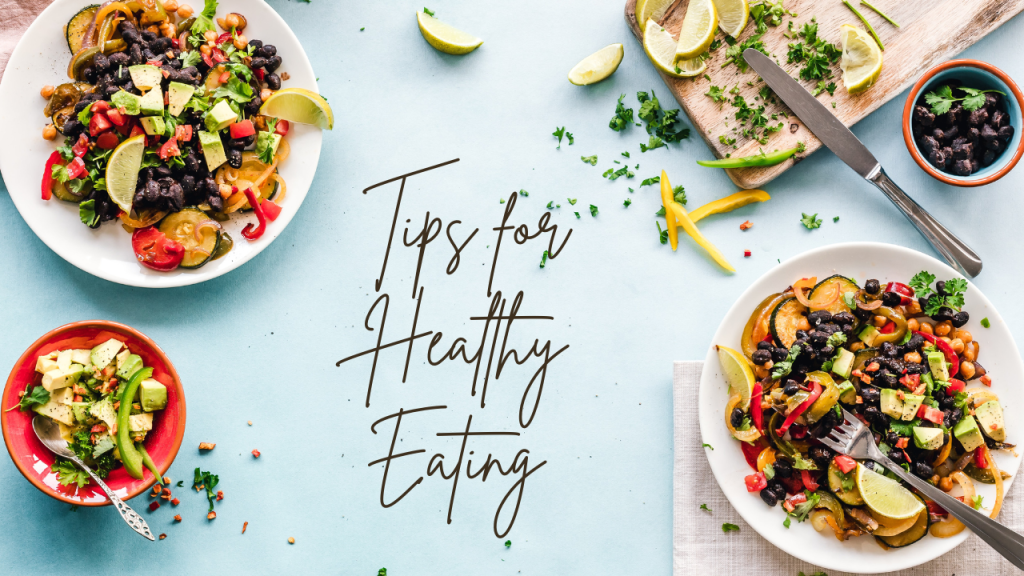
Eating healthy can be challenging in today’s fast-paced world, where we’re constantly bombarded with processed foods and unhealthy options. However, healthy eating doesn’t have to be complicated. With a few simple changes to your diet and lifestyle, you can improve your health and well-being.
The most significant information in this essay is that eating healthily doesn’t have to be difficult and that you may fuel your body while consuming the foods you prefer. Start small by adding nutrient-dense foods to every meal and snack and avoid processed meals if you want to eat healthily. Moreover, nutrition-related publications might be perplexing, but it’s crucial to keep in mind that food should be savored rather than tallied, weighed, and recorded.
Importance of healthy eating
Healthy eating is a term used to describe the practice of consuming a variety of nutrient-dense foods in appropriate portions to maintain good health and prevent disease. Eating healthy does not require following a specific diet. Instead, it means prioritizing your wellness by fueling your body with nutritious foods. This may be different for each person depending on their location, financial situation, culture and society, and taste preferences. For example, some people feel healthiest when following a low-carb diet, while others thrive on high-carb diets.
A healthy diet should consist of a balance of carbohydrates, proteins, healthy fats, vitamins, minerals, and fiber. Eating a healthy diet not only benefits your physical health but also your mental health and overall well-being.
Why is healthy eating important?
Healthy eating is important for many reasons, including fueling the body, acquiring necessary nutrients, lowering disease risk, increasing longevity, and promoting optimal mental and physical well-being. The quality of your diet affects your disease risk, longevity, and mental health. While diets rich in ultra-processed foods are linked to increased mortality and a greater risk of conditions like cancer and heart disease, diets comprising mostly whole, nutrient-dense foods are associated with increased longevity and disease protection. Additionally, diets rich in highly processed foods may also increase the risk of depressive symptoms, particularly among people who get less exercise. Lastly, if your current diet is high in fast food, soda, and sugary cereals but low in whole foods like vegetables, nuts, and fish, you’re likely not eating enough of certain nutrients, which may negatively affect your overall health (4).
- Disease Prevention: A healthy diet can help prevent chronic diseases such as heart disease, stroke, diabetes, and some types of cancer. Eating a diet rich in fruits, vegetables, whole grains, lean proteins, and healthy fats can help maintain a healthy weight, reduce inflammation, and lower blood pressure and cholesterol levels.
- Weight Control: Eating a healthy diet can help you maintain a healthy weight. Consuming nutrient-dense foods instead of high-calorie, low-nutrient foods can help reduce the risk of weight gain and obesity. Maintaining a healthy weight can also reduce the risk of chronic diseases (6.7).
- Improved Energy and Mood: A healthy diet can provide your body with the energy it needs to function at its best. Consuming whole grains, fruits, vegetables, and lean proteins can help maintain stable blood sugar levels and prevent energy crashes. Additionally, a healthy diet can help improve your mood and reduce symptoms of depression and anxiety.
- Improved Digestive Health: A healthy diet can promote good digestive health by providing fiber and a variety of nutrients that support the growth of healthy gut bacteria. This can help reduce the risk of digestive disorders such as constipation, inflammatory bowel disease, and colon cancer.
- Longevity: Eating a healthy diet can help you live a longer, healthier life. Studies have shown that consuming a diet rich in fruits, vegetables, whole grains, and healthy fats can reduce the risk of premature death (5).
What does a healthy diet look like?
A healthy diet should consist of a variety of whole, minimally processed foods. This includes:
- Fruits and vegetables: Aim to consume at least five servings of fruits and vegetables per day.
- Whole grains: Choose whole grains such as brown rice, quinoa, and whole-wheat bread instead of refined grains.
- Lean proteins: Choose lean proteins such as chicken, fish, and legumes instead of high-fat meats.
- Healthy fats: Include healthy fats such as avocado, nuts, seeds, and olive oil in your diet.
- Water: Aim to drink at least eight glasses of water per day.
- Limiting the consumption of processed foods, high-fat meats, sugary drinks, and snacks can also help promote a healthy diet.
In conclusion, eating a healthy diet is essential for maintaining good health and preventing chronic diseases. By consuming a variety of nutrient-dense foods in appropriate portions, you can improve your physical and mental health, control your weight, and improve your overall well-being.
Guide to healthy eating
In this definitive guide to healthy eating in real life, we’ll provide you with practical tips and advice to help you make healthier choices every day.
- Plan ahead
One of the biggest obstacles to healthy eating is a lack of preparation. When you’re busy, it’s easy to grab unhealthy snacks or fast food on the go. To avoid this, plan your meals and snacks ahead of time. Take some time on the weekend to prepare healthy meals for the week ahead, and pack healthy snacks to take with you when you’re on the go. This will help you stay on track and avoid temptation.
2. Prepare meals at home
Having a varied diet is made easier by cooking at home. If you’re used to eating out or ordering takeout, start by preparing only one or two meals each week.
3. Regular grocery shopping
You’re more likely to prepare healthy meals and snacks if your kitchen is stocked with nutritious ingredients. Do one or two weekly grocery excursions to ensure you have a supply of wholesome foods.
4. Choose whole foods
When it comes to healthy eating, the focus should be on whole, nutrient-dense foods. These are foods that are as close to their natural state as possible, such as fruits, vegetables, whole grains, lean proteins, and healthy fats. Avoid processed foods and foods with added sugars and chemicals, as these can be harmful to your health.
Nutrient density is the number of nutrients in food in relation to the calories it provides. All foods contain calories, but not all foods are nutrient-dense. For example, egg whites are much lower in calories and fat than whole eggs, but an egg white provides 1% or less of the Daily Value (DV) for iron, phosphorus, zinc, choline, and vitamins A and B12. Nutrient-dense foods include veggies, fruits, nuts, seeds, beans, fatty fish, and eggs. If your food choices are based solely on calories, you are missing the point of healthy eating. As a general rule, try to mostly eat foods that are high in nutrients like protein, fiber, healthy fats, vitamins, and minerals.
5. Mindful eating
In addition to choosing healthy foods, it’s important to practice mindful eating. This means paying attention to your body’s hunger and fullness cues and eating slowly and intentionally. Mindful eating can help you enjoy your food more and prevent overeating.
6. Stay hydrated
Drinking enough water is essential for good health. It helps keep your body hydrated, aids digestion, and can even help you lose weight. Aim to drink at least eight glasses of water a day, and avoid sugary drinks like soda and juice.
7. Get enough sleep
Sleep is essential for good health, and lack of sleep can hurt your eating habits. When you’re tired, you’re more likely to reach for unhealthy snacks and overeat. Aim to get seven to eight hours of sleep a night to help keep your eating habits on track.
8. Practice moderation
While it’s important to eat a healthy diet, it’s also important to allow yourself some indulgences in moderation. Don’t deprive yourself of your favorite foods entirely, as this can lead to binge eating and feelings of guilt. Instead, allow yourself a treat every once in a while and savor it mindfully (3).
9. Cut back on processed foods and beverages
Reducing your intake of ultra-processed foods, such as soda, mass-produced baked goods, candy, sugary cereals, and some packaged snacks, is the best way to optimize your diet. High fructose corn syrup, hydrogenated oils, and artificial sweeteners are linked to an increased risk of depression, heart disease, obesity, and a host of other problems (1,2). It is important to focus on nutrient-dense foods, especially vegetables, and fruits, and to minimize overly processed goods. Ice cream and sweets can be included in a balanced, nutritious diet, but they should not make up a large portion of daily caloric consumption.
10. Stay active
Regular exercise is essential for good health, and it can also help you make healthier eating choices. When you’re active, you’re more likely to crave healthy foods and avoid unhealthy snacks. Aim to get at least 30 minutes of exercise a day, whether it’s walking, running, or doing a workout at home.
11. Seek support
Healthy eating can be challenging, especially if you’re making big changes to your diet and lifestyle. Seek support from friends and family members who are also trying to eat healthily, or join a support group or online community. Having a support system can help you stay motivated and accountable.
In conclusion, healthy eating is all about making small changes to your diet and lifestyle that you can stick to in the long term. By planning, choosing whole foods, practicing mindful eating, staying hydrated, getting enough sleep, practicing moderation, staying active, and seeking support, you can improve your health and well-being and feel your best. Remember, healthy eating is not about deprivation or perfection – it’s about balance and making healthy choices most of the time.
References
https://www.ncbi.nlm.nih.gov/pmc/articles/PMC6538973/
https://pubmed.ncbi.nlm.nih.gov/32792031/
https://www.ncbi.nlm.nih.gov/pmc/articles/PMC7019245/
https://www.ncbi.nlm.nih.gov/pmc/articles/PMC6650179/
